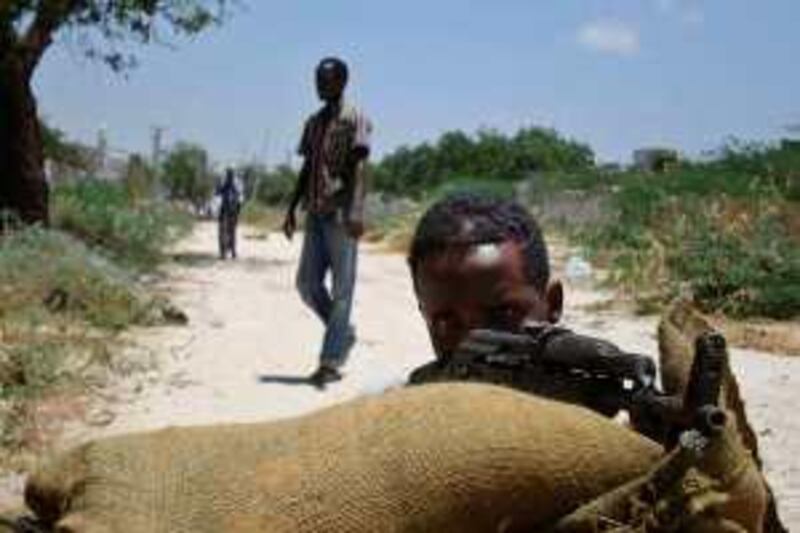NAIROBI // United Nations peacekeepers were run out of Somalia in 1995. Fourteen years later, the UN might send the blue helmets back in. The UN Security Council recently discussed establishing a peacekeeping force in Somalia, which has been beset by 18 years of civil war and anarchy. Analysts said a full UN mission is still a long way off, but UN resources may be used to bolster the African Union force in Somalia that is underfunded and frequently besieged. Somalia could use the support at the moment. A new government, led by President Sheikh Sharif Ahmed, a moderate Islamist, has been struggling with an Islamic insurgency with links to al Qa'eda. Al Shabab, the insurgent group, has become increasingly emboldened, especially after an audiotaped message from Osama bin Laden last week that was seen as a pep talk. The Security Council adopted a resolution in December expressing its intention to establish a peacekeeping mission in Somalia and is expected to make a final decision by June 1. "I note that the council has not yet made a decision to deploy a peacekeeping operation, and that there remains uncertainty about whether peacekeeping is the right tool to support the political process in Somalia," Ban Ki-moon, the secretary general, said last week. The Security Council agreed to support such African Union peacekeeping missions as those in Somalia and Darfur. Support would include funding, training and logistical support for AU missions. UN peacekeepers are already stretched thin across Africa. Of the 16 current UN peacekeeping missions, seven are in Africa, including the two biggest; an 18,000-troop mission in Democratic Republic of Congo and a 15,000-troop joint UN-AU mission in Darfur. At least 22,000 troops would be needed for a force in Somalia, UN estimates show.
The African Union, which has 3,000 troops from Uganda and Burundi in Somalia and is frequently under attack, recently renewed its mandate for three months. Insurgents last week killed one AU peacekeeper and wounded four. Eleven peacekeepers died in attacks last month. The AU on Friday asked the UN to send peacekeepers to Somalia before its mandate expires. The Security Council may be reluctant to commit peacekeepers to Somalia because of the country's recent history. Since the country's war began in 1991, foreign peacekeeping missions have had a rocky time in Somalia. US troops pulled out of Somalia soon after suffering heavy casualties in a 1993 battle in Mogadishu chronicled in the book and film Black Hawk Down. UN peacekeepers left two years later amid deteriorating security. In 2006, an Islamic group briefly came to power and restored some stability. Ethiopian troops entered Somalia, routed the Islamists and stayed to provide security. The Islamists launched an insurgency against the Ethiopians and transitional Somali government and eventually drove the Ethiopians out at the beginning of this year. Analysts say the UN will not send peacekeepers to Somalia until the country is more stable. "A peacekeeping force where there is no peace to keep is problematic," said Rashid Abdi, a Somalia analyst with International Crisis Group, an independent think tank. "The solution is a comprehensive peace process which leads to a powerful government. Then there will be a role for peacekeeping. At the moment, we are a long way off from peacekeepers." A strong UN force could restore order and allow for aid to be delivered more effectively. Currently, three million Somalis are dependent on food aid, which has been increasingly difficult to deliver because of the security situation. Last year, 35 aid workers were killed in Somalia and 26 were abducted. "It is probably one of the worst humanitarian environments to operate in overall," said Dawn Blalock, a spokeswoman for the UN humanitarian affairs Somalia office. "It is a challenging climate in terms of security." Ahmedou Ould-Abdallah, the UN special envoy to Somalia, told the Security Council on Friday that the security situation was improving in Somalia pointing to the fact that the president and parliament have recently returned to work in Mogadishu from self-imposed exile in Djibouti. "Somalia is back from the brink," he said. But amid the new hope for Somalia, bin Laden released an 11-minute audio tape on Friday that called for al Shabab to overthrow Mr Ahmed, the president. Mr Ahmed, a former leader of the Islamic movement that controlled Somalia in 2006, has said he will impose Islamic law in Somalia in an effort to reach out to hardline Islamic groups. In the recording, titled Fight on Champions of Somalia, bin Laden said Mr Ahmed "turned to partner with the infidel. He must be dethroned and fought." Mr Abdi, the analyst, said the tape shows the international community should pay attention to Somalia so it does not become a haven for terrorists. "The fact that al Qa'eda's number one person, bin Laden, devotes 11 minutes of his time to Somalia is significant," Mr Abdi said. "We know that al Qa'eda has been sympathetic to the radical al Shabab movement. We shouldn't underestimate al Qa'eda's interest in Somalia." mbrown@thenational.ae





